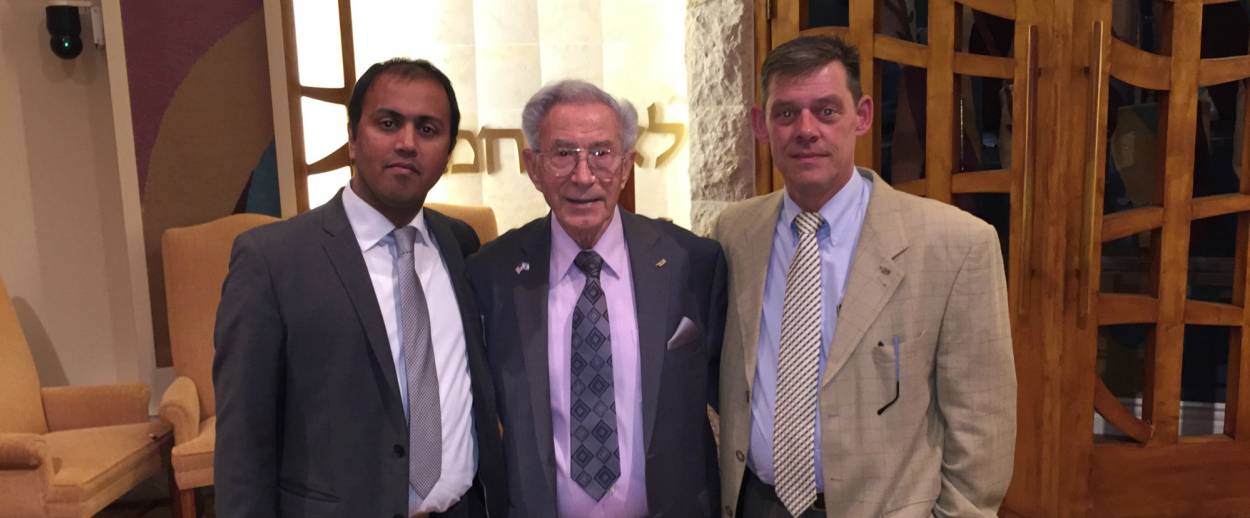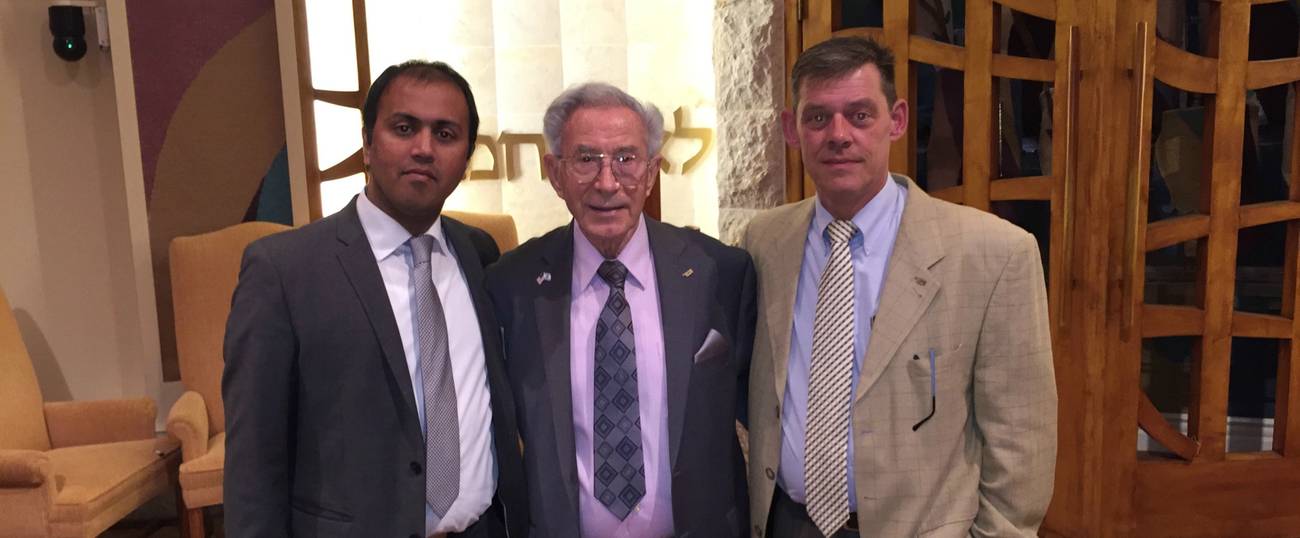Life After Dachau
The unlikely friendship of a concentration camp survivor, the grandson of a Nazi commandant, and a Pakistani-German attorney




It sounds like the beginning of a joke: A concentration camp survivor, the grandson of a Nazi commandant, and a Muslim walk into a courtroom. What do you get?
But the relationship between Ben Lesser, Rainer Hoess and Khubaib Ali Mohammed is anything but comic. The unlikely trio of men are friends. Good friends. Real friends, working toward a shared goal.
The story begins, as so many Holocaust tales do, in Krakow, where Benek Lesser was born in 1928 to a family of Orthodox Jews. Lesser and his four siblings had a charmed life. Their mother, Shaindel, came from a prominent family in Munkacs, Czechoslovakia; their father, Lazar, ran a kosher wine- and fruit-syrup manufacturing business, along with a chocolate factory. They were prosperous and happy. Until they weren’t.
Of the entire Lesser clan, only Ben and his sister Lola survived the war. Ben was imprisoned in Auschwitz-Birkenau, Durnhau labor camp, Buchenwald, and Dachau, where he arrived after a three-week-long Death Train. Three days later, he was liberated. He eventually came to America, married, raised a family, and got into real estate in Los Angeles before retiring to Las Vegas.
One morning in January 2015, Lesser was flipping through TheWall Street Journal when he stumbled upon a story about a German named Rainer Hoess. The hairs on Lesser’s arms bristled. He knew that last name: It was the same name as Rudolf Hoess, the man who introduced Zyklon B to Auschwitz, and orchestrated the annihilation of over 1.5 million Jews, including members of Lesser’s family. Rainer was his grandson.
“It gave me a jolt,” said Lesser, who turns 90 in October, from his home in Las Vegas.
“When I read the article I was shattered,” Lesser recalled. “I wasn’t expecting to see that name ever again. He was responsible for killing part of my family and many other distant relatives, and yet his grandson was going from school to school talking about his grandfather and tolerance and love instead of hate.”
Yet he couldn’t stop reading. and soon Lesser discovered something he had not anticipated: He shared an affinity with the younger Hoess. Lesser had founded the Zachor Holocaust Remembrance Foundation, which fights intolerance and hate. Hoess had his own organization, The Footsteps Team, with a similar mission.
Lesser had to meet him. So his daughter, Gail, dropped Hoess a message on Facebook and Twitter. Within an hour, the two men were talking on the phone like old buddies.
Over the years Hoess had reached out to over 100 survivors, but not everyone wanted to talk to him. “Ben was the first one from all survivors who reached out to me,” Hoess, now 53, recalled during a telephone conversation from his home in Stuttgart. “He said he was going to be at the 70th anniversary of Dachau’s liberation—would it be OK for me to meet him there?” Hoess wanted to go. But then he realized that the media attention would have focused on him, rather than on the survivors and liberators. So the survivor and the grandson of the Nazi commandant met instead at a resort outside Munich.
It was deeply moving for both men. “He came closer to me and we embraced,” Lesser recalled in his gently accented English. “We couldn’t let go. Both of us were practically crying, holding each other so tight. It must have been a few minutes. He must have felt that I’m a victim, and I felt, it’s not his fault. This man couldn’t choose who to be born to.”
Today, Hoess has the numbers of three survivors tattooed on his chest, along with a Star of David and the words Never Forget. But as a boy growing up in Ludwigsburg, he didn’t know much about his grandfather, who was hanged on a gallows near the crematorium on April 2, 1947. All Hoess had been told was that he was a “good soldier” who was “just doing his job,” and that’s what he believed.
“In the family, he was the behaved soldier, the good commandant,” said Hoess. “That was said by my grandmother as well. She never said Auschwitz was a concentration or extermination camp. She said it was a prison.”
When Hoess was 15 he says that his father, Hans-Jurgen, Rudolf’s son, placed a sign on their fence with the slogan “Jews are not welcome” here. Around that same time he found Rudolf Hoess’ memoir Commandant of Auschwitz in a friend’s family library. That’s when he finally understood the truth about his lineage. “I immediately packed my clothes and got out,” he said. “It was the only possibility for me to escape that family.”
He had no contact with his family for about a decade. He became a cook, fathered a child at 17, and delved into drugs. He was spiraling downward until his boss at the hotel where he worked took him under his wing. “He told me there were better things in store for me,” said Hoess. “Without him I’d be a criminal.”
He immersed himself in study of the Holocaust, trying to learn as much as he could about his grandfather. “I cannot believe that he was a beloved father and hugged his kids and 20 minutes later he killed these other kids,” said Hoess, who has suffered three heart attacks and a stroke, which he speculates could have been a reaction to the horrors of discovering the truth about his grandfather. He also believes that Rudolf fabricated much of his autobiography, including his estimates that he “only” killed 1.5 million.
“Every story he told about the First World War, that he was a soldier and youngest officer–it’s a lie,” he said. “I didn’t find any documents about him in the First World War. When he lies about his activities in the First World War, how can we trust his lies about World War II? That’s a question which haunts me. I’m sure there were more people killed at Auschwitz than in the statistics.”
Nor does he believe that his father, and his aunt Ingebirgitt Hannah Hoess, who lived in Washington under a fake identity, didn’t know what was going on in the camps. “He said, ‘We had no clue, we were kids.’ That’s an excuse,” said Hoess, who hasn’t spoken to his father since 1985. He has visited Rudolf’s villa near the camp, where he raised his family in gilded splendor. The family had servants, many of whom were prisoners.
“You could see everything from a window upstairs,” he said. “You see the chimney of the crematoria and the gas chamber. So how can they say that they have no clue what happened on the other side of the fence? I have kids by my own and know very well how much they know in that age of 10 or 11.” (He has four children and three grandchildren.)
Hoess has been to Auschwitz more than 30 times, alone, with his mother, and with students from around the globe. He knows it sounds crazy, but he can feel his grandfather’s breath on his neck when he’s there. “When I enter the camp my blood pressure goes up,” he said. “Normally it’s 110. When I’m inside the camp it’s between 140 and 160, and I feel he is with me. You cannot explain that.”
About four years ago, Hoess was introduced to Khubaib Ali Mohammed, a Pakistani Muslim who moved to Berlin as a child. Mohammed had worked for years as a defense attorney in Germany, defending bank robbers and murderers.
It wasn’t for him. “I felt the victims didn’t get treated properly,” said Mohammed, 37, in a phone interview. “Someone gets beaten up and he comes to court and I was defending him. As soon as the witness was heard we’d say, ‘Now that the victim is gone we can go on with business as usual without any tears.’”
In 2013, he quit his defense work and began working as a private prosecutor in high profile criminal cases: Victims of Nazis, neo-Nazis and terrorist attacks. Two years later, he was a prosecuting attorney in the case of Oskar Groening, the so-called “bookkeeper of Auschwitz” who was a former corporal in the Waffen-SS, the military branch of the SS. He was accused of being an accomplice in the execution of 300,00 Hungarian Jews.
He met Hoess, who was advising the prosecutors, during this period. Hoess asked him if he would be willing to represent Lesser, who was a witness in the case.
“I said, why not?” said Mohammed. The two men flew to Las Vegas, got Lesser’s witness testimony, and Mohammed read it in court. Groening was ultimately found guilty and sentenced to four years in prison; he died in March 2018, at age 96, before serving any time.
The three men had such a connection that Lesser suggested they return and do speaking events at Midbar Kodesh Temple in Henderson, Nevada, Temple Beth Sholom in Summerlin, Nevada, and at the Skirball Cultural Center in Los Angeles. “A Jew, a Muslim, and a German, the grandson of the biggest killer—what a great idea,” said Lesser. “But we couldn’t advertise it, because some neo-Nazis could show up. We didn’t want the press. So, word of mouth and emails among the Jewish community.”
The rooms were packed.
“I was welcomed by the people with great love, with great respect and nothing like, ‘Oh, he’s a Muslim,’” Mohammed said. “It was amazing to see that people can talk to each other if they are willing to do that. To build bridges.”
Lesser continues to speak at schools; his latest project is I-Shout-Out, which encourages students to “shout out” against intolerance, hatred, and bullying. One day he’d like to visit students Newtown, Connecticut, and Parkland, Florida. “These kids are terrorized, their whole life has changed,” he said. “But you can still have a beautiful life after what you went through.”
Lesser doesn’t like to talk politics—it “automatically eliminates 50 percent of the nation if they find out I’m a Democrat or Republican,” he said.
But Hoess does. Right now he’s battling the rapidly expanding right-wing community in Germany, which terrifies him. He doesn’t think people have learned anything from Nazi Germany. “Only the name changed and the year,” he said.
And issuing warnings about the U.S.: “When I see a president like Mr. Trump I’m really shocked with how he’s dealing with his position in the world,” he said. “He’s not a president, he’s a businessman, and that’s how he acts. He is a person who spreads hate in the world.”
Over the years Hoess reconciled with his mother, who has since died, but he doesn’t communicate with any other family members. He doubts he ever will. They still deny that Rudolf Hoess was an architect of death. “I am the black sheep in the family,” he said. “And I am happy and proud to be the black sheep”
“I have no guilt,” he continued. “I’m ashamed of what my family did, but I never thought to change my name—it’s the best weapon I have.”
Abby Ellin is the author of the forthcoming, Duped: Double Lives, False Identities, and the Con Man I Almost Married.
Abby Ellin is the author of the forthcoming, “Duped: Double Lives, False Identities and the ConMan I Almost Married.”